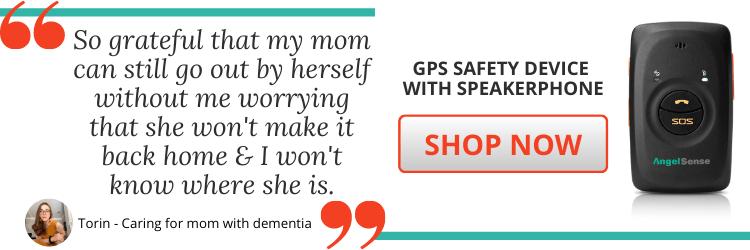Unsure How to Protect a Loved One with Alzheimer’s from Wandering? Start Here
Updated on January 22, 2024It’s not uncommon for an elderly person with dementia or Alzheimer’s Disease to wander. What makes this particularly worrying is that this can happen regardless of how advanced the disease is. In fact, some research suggests that at least 60% of Alzheimer’s sufferers will wander at some point during the progression of the disease. This often results in a person getting separated from their loved ones, and can put their life at risk. The fear is that if an individual with Alzheimer’s is not found within 24 hours of elopement, they’re more likely to suffer severe injury or even death.

Alzheimer’s-related wandering is a source of much stress for family members and caretakers. This is largely because these incidents can happen at any point with little or no warning. Whether or not your loved one has a tendency to wander, it’s important to understand what triggers this behavior. This will not only make it easier to prevent tragedy, but will also help you find a solution for your family member that honors their dignity and lets them remain as independent as possible.
Why do people with Alzheimer’s wander?
No two people with Alzheimer’s behave in the same way. It’s important to understand that there are many different reasons a person with this disease may wander. Once you understand what causes this behavior in your loved one, you’ll be in a better position to meet their needs and address the problem.
It’s a good idea to keep a journal for a few weeks to help you identify any triggers which need to be addressed. Here are a few of the most common reasons an Alzheimer’s sufferer may wander.
Force of habit: A person with Alzheimer’s may leave the house to follow a daily routine they’ve become accustomed to, and suddenly forget what they were doing. This can happen even if it’s something they’re used to doing on a regular basis like going to work or the grocery store.
Agitation: Any form of discomfort, whether it’s noise or unfavorable temperature, can result in fear and stress which is often a trigger for wandering.
Not having basic needs met: Hunger or a need to use the bathroom can also cause an Alzheimer’s sufferer to wander in search of what they feel they’re lacking. For many people with Alzheimer’s, walking is a way to alleviate pain and discomfort.

Boredom: As the disease progresses, your loved one may find it increasingly challenging to focus on anything. This can make a person feel exceptionally frustrated, and leads to boredom. Wandering is an effective way to burn excess energy and keep occupied.
How can you protect your loved one from the dangers of wandering?
Understanding what causes your loved one to wander is key to preventing repeat incidents. However, this isn’t always enough. Even the most dedicated caretaker or family member can’t guarantee that an accident won’t happen.
There are, however, steps you can take to ensure someone with Alzheimer’s remains safe even if they wander. It’s our hope that these strategies will help you protect your loved one your way, and will give you the peace of mind you need to go about your day worry free.
1. Make sure they carry some form or identification
While an ID won’t prevent a person from wandering, it can make it easier for strangers to help them get home. Keep in mind that an ID kept in a wallet or pocket may not be the best option as this can be misplaced easily. You might want to look into an ID bracelet or pendant which is more difficult to remove. Another option is to sew an ID tag with relevant contact information into their clothing.
2. Organize supervised exercise sessions

Increased physical activity during the day has been found to decrease the likelihood of nighttime wandering in some Alzheimer’s sufferers. This is also a good way to ensure your loved one remains occupied and can help reduce agitation. Depending on how severe the disease, you may want to make sure these exercise sessions are supervised.
3. Develop a sleep schedule
Nighttime wandering can sometimes be caused by sleeplessness. It’s therefore important to make sure your loved one gets enough sleep every night. You should also try to create a regular sleep schedule with a set time for going to sleep and waking up. Reducing caffeinated beverages and napping during the day can also help with regulating sleeping patterns.
4. Create a daily routine

Structure and routine can help keep an Alzheimer’s sufferer calm and may reduce the likelihood of wandering. The routine should be designed in such a way that you ensure that your loved one’s basic needs are met, and will help keep them content and safe.
5. Invest in a GPS tracking device
A GPS tracking device for elderly with Alzheimer’s, like AngelSense, makes it easy to track a loved one’s whereabouts. This means that even if they do wander, it will be easy to find them in a matter of seconds. The added benefit of this is that your loved one won’t need to be supervised at all times, and they’ll have the opportunity to enjoy some independence. AngelSense also includes a listen-in feature which lets you hear what’s happening in your loved one’s surroundings, so you’ll be able to immediately take action if you discover that they’re in trouble.
There are many different strategies for keeping an individual with Alzheimer’s safe. You’ll need to find what works best for your loved one. Whatever approach you choose, keep in mind that wandering, while stressful, is manageable without drastically changing your or your loved one’s daily routine.


Where can I buy the special belt
Hi Barrie, it is currently available in the AngelSense Store inside the application when you log in under your account.
Kind regards,
Sidra
Producing an Alzheimer’s & Caregivers symposium on August 12. Would like to talk with you about displaying your product at the conference. Thanks
Hi Roslyn,
Sending you an email and passing on your info to our marketing team.
Thanks,
Sidra
Try AngelSense Risk Free
FREE DEVICE
See PlansSession Changed
Your session has changed. Please close this tab.